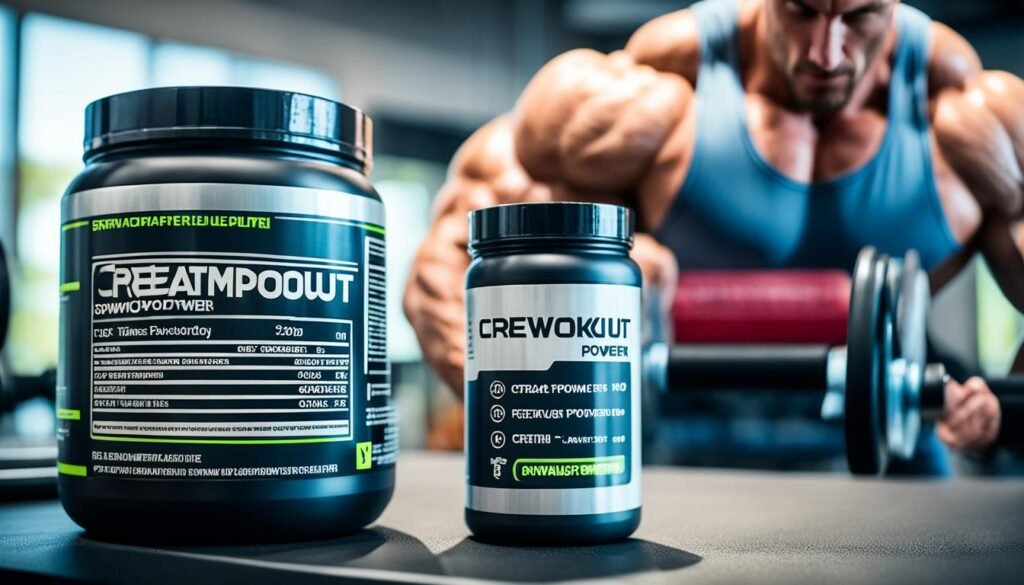It may come as a surprise to many in the fitness community that the human body produces approximately 1 gram of creatine naturally each day. While this internal production is crucial, it pales in comparison to the heightened muscle stores achieved through strategic supplementation of creatine monohydrate. As I delve into the quest to maximize muscle gains with creatine, a recurrent question arises: when is the best time to take creatine for muscle strength and recovery?
The optimal time to consume creatine for muscle growth has sparked much debate among athletes and researchers alike, but what remains uncontested is creatine’s powerful role in fueling muscles during intense workout sessions. The daily intake of creatine, most notably in its monohydrate form, has been linked to enhanced performance and recovery, making its precise timing a subject of keen interest for those looking to optimize their fitness regimen.
Key Takeaways
- The body’s natural production of creatine is supplemented for improved muscular performance.
- Creatine monohydrate is key in elevating muscle creatine stores, crucial for ATP regeneration.
- Consistent consumption of creatine may be more critical than the specific timing relative to workouts.
- Timing strategies should complement individual dietary routines and workout plans.
- Enhanced muscle gains can be achieved by maintaining elevated creatine levels in the muscles.
- The debate about the best time to take creatine for muscle underscores the need for a balanced approach that incorporates lifestyle considerations.
Understanding Creatine’s Role in Muscle Synthesis
As someone deeply invested in optimizing my fitness performance, I’ve taken a keen interest in creatine supplementation for fitness performance. The dramatic impact of this compound on muscle synthesis cannot be overstated—it is a cornerstone of my regimen. Creatine’s function transcends merely bulking up; it is fundamental to the phosphocreatine system in muscle activity, enabling the body to perform at its peak when it matters most.
How Creatine Enhances Muscle Mass and Physical Performance
Since incorporating creatine into my routine, the change in my muscle mass and strength has been remarkable. It’s no surprise that countless athletes rely on creatine for its potent effects on physical performance. By increasing the water content within muscle cells, it creates a necessary cellular environment that promotes muscle growth—a process known as cell volumization. This elevation in cellular volume is a signal for increased muscle mass and, subsequently, strength.
The Science Behind ATP Regeneration and Creatine
The science is clear: creatine for rapid ATP regeneration is an absolute game-changer. For exercises that require quick bursts of power, our muscles depend on ATP (adenosine triphosphate), and creatine supplements ensure that the ATP supply doesn’t dwindle when you’re pushing hard. This is due to creatine’s role in recharging spent ATP molecules, a critical component of the high-energy phosphocreatine system. Engaging in resistance training or high-intensity interval training, my reliance on this system is unwavering.
Creatine Timing: Pre-Workout Advantages

When considering timing creatine intake for muscle building, one recurrent question I encounter is: “When should I take creatine for the best muscle results?” To determine the ideal timing strategies for optimal creatine absorption, it’s essential to delve into the relationship between creatine ingestion and workout performance.
The prevailing theory suggests that taking creatine in close proximity to your training session may enhance your body’s ability to perform high-intensity exercise. This is based on creatine’s role in the rapid regeneration of ATP, necessary for bursts of activity such as weightlifting or sprinting. Yet, despite such theoretically sound reasoning, research on the topic presents a variety of outcomes.
- Consistency in creatine supplementation yields increased muscle creatine stores overall, regardless of timing.
- The direct impact of pre-workout creatine consumption on performance enhancement is still not conclusive.
- Daily supplementation is key to maintaining the benefits of creatine for muscle growth and recovery.
While the effectiveness of creatine is not disputed, the importance of its timing—specifically pre-workout—remains a topic of discussion within the fitness community.
| Study | Creatine Timing | Observed Benefit |
|---|---|---|
| Creatine Kinetics | Pre-Workout | Maintained ATP Levels During Exercise |
| ATP Advantage | Post-Workout | Enhanced Recovery and Muscle Repair |
| Muscle Building Metrics | Non-Time Specific | Increase in Muscle Creatine Content |
Given these findings, consistency in creatine intake seems to play a far more crucial role than the specific window of consumption. Still, individual preferences and the body’s response should guide one’s timing strategies for personal optimization.
In summary, while timing your creatine intake around your workout may offer potential benefits to some individuals, the emphasis remains on regular, consistent supplementation to ensure optimal muscle creatine saturation for muscle building.
Is Post-Workout Creatine Consumption More Effective?
As a fitness enthusiast always seeking to optimize my training results, I’ve often delved into the best creatine dosing schedule for muscle synthesis. It’s essential to recognize that the timing of supplementation may significantly impact the efficacy of creatine, particularly concerning muscle recovery and growth. Let’s explore the current research and outcomes associated with post-exercise creatine intake.
Analyzing Studies on Post-Exercise Creatine Intake
Recent studies have attempted to unravel the potential advantages of post-workout creatine consumption. Some evidence suggests that participants who take creatine immediately after their workout sessions experience more pronounced improvements in lean mass and strength. This has led to a growing interest in post-exercise creatine supplementation as a possible best practice for athletes and bodybuilders aiming to maximize their gains.
Impact of Creatine on Muscle Recovery and Growth Post-Exercise
The question of when to take creatine to enhance muscle recovery remains a topic of discussion among fitness professionals. The hypothesis is that by supplying the muscles with this vital nutrient at a time when they are most receptive – right after a workout – the body can expedite the muscle repair process and thus foster better growth. This approach could theoretically serve as a strategic addition to one’s post-exercise nutrition protocol, functioning as an accelerant to the muscle synthesis process.
| Supplementation Timing | Lean Mass Gains | Strength Increases | Recovery Enhancement |
|---|---|---|---|
| Immediate Post-Exercise | Higher | Notable | Improved |
| Hours Post-Exercise | Moderate | Mild | Standard |
| Next Day | Baseline | Baseline | Baseline |
In conclusion, while the debate regarding the timing of creatine intake continues, the tilt of current research supports the theory that immediate post-exercise creatine supplementation could be beneficial in enhancing muscle recovery and growth. However, it’s critical to stay updated on ongoing research to refine these strategies for optimal results.
Best Time to Take Creatine for Muscle

As I delve into the topic of recommended timing for taking creatine for muscle development, it’s pivotal to recognize how personal schedules and practices come into play. Based on a myriad of studies, a consensus suggests that the importance of timing creatine consumption for muscle mass may not be as critical as once thought. Instead, the emphasis should be on maintaining an elevated creatine level in the muscles.
Determining what is the optimal time to consume creatine for muscle growth is less about searching for a one-size-fits-all answer and more about tailoring intake to individual needs. Be it ingestion before lifting weights or after the final set, the integral factor remains consistency.
To better illustrate the flexibility in creatine consumption timing, let’s look at the different approaches fitness enthusiasts may adopt based on their unique regimens:
- Pre-Workout Timing: For those who prefer to prepare their muscles with a rush of energy, taking creatine before a workout session might be ideal.
- Post-Workout Timing: Others find that consuming creatine after exercise may support recovery and capitalize on the body’s anabolic state.
- Anytime Supplementation: On non-workout days, the timing is even less significant, as the goal is simply to keep muscle creatine stores topped up.
| Timing | Benefits | Considerations |
|---|---|---|
| Pre-Workout | Readies muscles with immediate energy supply | May benefit those engaging in intense anaerobic activities |
| Post-Workout | Possibly enhances muscle recovery and growth | Can leverage the body’s heightened nutrient absorption post-exercise |
| Non-Workout Days | Maintains constant muscle creatine levels | Flexibility in timing allows for easier regimen adherence |
What remains crystal clear is the importance of timing creatine consumption, not in the rigid sense of an exact clock point, but in ensuring that you do not overlook your supplementation on any given day. Focus on your fitness goals, diet, and workout intensity to determine the timing that aligns with your lifestyle, granting you the best results in muscle growth and endurance.
Timing Creatine Intake on Rest Days
Understanding the impact of creatine supplementation on off days is crucial to optimizing muscle development and recovery. When the body is not actively engaged in strenuous activity, maintaining creatine levels is still essential for continuous progress. In my experience, the importance of consistent daily creatine intake for muscle development cannot be overstated, even on days without training.
Maintaining Creatine Levels in Muscles During Recovery
Downtime provides an opportunity for our muscles to repair and rebuild, a process that can be supported by creatine. The rationale lies in maintaining the high saturation of creatine in muscle tissue, which assists in recovery and paves the way for growth. Though the spotlight often falls on workout days for creatine use, ensuring a steady supply on rest days is equally beneficial. This strategic approach aligns with the concept that uninterrupted supplementation, rather than sporadic intake, leads to the most substantial gains.
How Rest Day Creatine Supplementation Supports Muscle Growth
The creatine loading phase importance sets the stage for continued effectiveness. Initiating a regimen with a higher dosage over a short period ensures that muscle creatine stores are optimally filled. This is then followed by a maintenance amount that ensures these levels are preserved, even on days without exercise. By incorporating creatine into a meal, especially one rich in carbohydrates which may help with absorption, muscle tissue remains primed for growth and repair.
It’s not just about maintaining what’s been built during workouts; it’s about setting the stage for future sessions. Whether it’s a simple jog or a strenuous weightlifting session, daily creatine intake ensures that my muscles are always at the ready. Ultimately, through consistency in supplementation, I have experienced noticeable improvements in recovery and overall muscle development — a testament to the continuous support that creatine provides.
Creatine Dosage and Absorption: Maximizing Benefits

For those focused on maximizing muscle gains with creatine, understanding the significance of the right dosage and optimal absorption strategies is paramount. A two-tiered approach, consisting of the creatine loading and maintenance phases, is frequently recommended to kickstart the process of muscle development.
The loading phase typically spans 5 to 7 days and involves consuming 20 grams of creatine per day, divided into four 5-gram servings. This initial high dosage is scientifically crafted to elevate your muscle’s creatine reserves rapidly. Following this, you transition into the maintenance phase, where a daily intake of 3-5 grams is aimed to maintain these elevated levels of creatine in the muscle tissue. For individuals aspiring to optimal creatine absorption for muscle development, consistency is crucial, irrespective of whether it’s a workout or rest day.
| Phase | Dosage | Duration | Purpose |
|---|---|---|---|
| Loading | 20g daily (4 servings of 5g) |
5-7 days | Rapidly increase muscle creatine levels |
| Maintenance | 3-5g daily | Ongoing | Sustain muscle creatine saturation |
Combining creatine with nutrients that facilitate its uptake can further enhance its absorption. For example, pairing your creatine dose with carbohydrates may exert a synergistic effect that enhances creatine retention, improving overall results in muscle development.
- Evidence suggests that ingesting creatine with a carbohydrate or protein source can improve its muscular uptake.
- Simple sugars often used in combination with creatine can initiate a spike in insulin, which in turn assists in driving more creatine into muscle cells.
- Consuming creatine with a meal that contains both proteins and carbohydrates can offer the same benefits without the need for excess simple sugars.
Understanding and applying these principles can lead to more efficient creatine utilization, subsequently driving better performance and muscle growth outcomes. Above all, the consistent application of these dosing protocols is a cornerstone in the pursuit of muscle gains through creatine supplementation.
Combining Creatine with Other Nutrients for Enhanced Uptake

To optimize my fitness regimen, I’ve explored the potential benefits of combining creatine with carbohydrates and the importance of protein with creatine supplementation. Striving to amplify the effectiveness of creatine, I’ve consulted numerous studies indicating that its absorption can be enhanced when taken in tandem with other nutrients.
The Role of Carbohydrates in Creatine Absorption
Carbohydrates play a pivotal role in the body’s insulin response, which may aid in the transport of creatine into muscle cells. By enhancing creatine absorption with carbs, we can possibly accelerate its benefits. Although some research presents mixed findings, I believe that a balanced dietary approach is advantageous for most nutritional strategies.
Incorporating Protein into Your Creatine Dosing Schedule
The symbiosis between creatine and protein furthers the aid in muscle repair and growth, elucidating the importance of protein with creatine supplementation. My personal experiences align with the evidence suggesting that protein and creatine may work together to promote better retention and muscle strength gains.
| Nutrient | Role in Creatine Absorption | Beneficial Effects for Muscle |
|---|---|---|
| Carbohydrates | Stimulate insulin, enhance creatine transport | Increased muscle uptake and energy |
| Protein | Aids in retention and synthesis | Supports recovery and muscle strength growth |
Conclusively, while my experiences have taught me that enhancing creatine absorption with other nutrients such as carbohydrates and protein can be a game-changer for many athletes, individual responses may vary, and it’s essential to adjust based on personal nutritional needs and fitness goals.
Long-term Use of Creatine: What Science Says

As someone who places value on health and performance, understanding the implications of long-term creatine supplementation is vital. Over the years, I’ve sifted through the available research on extended creatine use and how it influences muscle health. In doing so, I’ve uncovered a variety of studies underscoring its safety over prolonged periods.
Evaluating Research on Extended Creatine Use and Muscle Health
Research indicates that creatine, when used consistently, supports muscle function and has been deemed safe for long-term intake. Key studies examining the use of creatine for periods extending beyond the standard 16 weeks found no adverse effects on healthy individuals. This is reassuring for those of us who rely on creatine for its performance-enhancing benefits and are looking for confirmation on its safety with extended use.
Practical Guidelines for Long-Term Creatine Consumption
Despite its proven track record, one should approach long-term creatine supplementation with a measure of caution, especially if there are underlying health issues. For instance, individuals with renal conditions are advised to monitor their health closely while using creatine. Ensuring the purity of creatine supplements is another crucial practice; sticking to reputable brands minimizes the risk of contaminants that could harm one’s health.
Here’s some practical advice on sustained creatine use: always follow the dosage guidelines provided by the product manufacturer. And remember, more isn’t always better. Using creatine within recommended guidelines is the most effective approach for maintaining its benefits over the long term.
Conclusion
In rounding off our exploration into the world of creatine supplementation, it becomes clear that while we constantly seek strategies to optimize our health and fitness routines, the exact timing of creatine intake is less pivotal than we might have once thought. Summarizing optimal creatine timing does not pinpoint a singular, universally superior moment for consumption. My final thoughts on creatine scheduling for muscle enhancement revolve around the central theme of maintaining consistency. To maximize muscle development, the emphasis should be on ensuring that muscle creatine stores remain high, a factor which remains unaffected by the exact timing of intake.
As I dissect the array of studies and research, I find that the definitive guide to creatine intake timing hinges on individual customization. Adapting creatine supplementation to fit one’s unique dietary preferences and workout schedule is more beneficial than strictly following prescribed timing regimen. What does stand out in my evaluation is the importance of the synergy between creatine and other nutrients like carbohydrates and protein—this can significantly aid in the body’s absorption of creatine and should not be overlooked in one’s nutrition plan.
Ultimately, my deep dive into creatine research reaffirms that for individuals committed to achieving greater muscle strength and improved overall well-being, what truly matters is a stable and regular intake of this potent supplement alongside a balanced diet and workout regimen. Recognizing the correct dosage and long-term application is equally critical to enjoy the full spectrum of benefits that creatine has to offer. And always remember, listening to your body and being attuned to its response to supplements like creatine is paramount in the journey towards optimal fitness and health.
FAQ
What is the best time to take creatine for muscle growth?
While research does not provide a definitive answer, consistent creatine supplementation is crucial. Taking creatine before or after workouts, or at a regular time on non-workout days can help maintain elevated muscle creatine levels, which is essential for muscle growth.
How does creatine enhance muscle mass and physical performance?
Creatine supplementation supports muscle mass increment by enhancing the rapid regeneration of ATP—the primary energy carrier during high-intensity activities. This increased ATP regeneration capacity supports greater power and endurance during workouts, contributing to muscle growth and performance.
Does taking creatine pre-workout offer any advantage?
Some individuals may find taking creatine pre-workout beneficial as it could theoretically offer immediate support for high-intensity training through rapid ATP regeneration. However, studies indicate similar benefits whether creatine is taken before or after workouts, suggesting that the focus should be on overall regular supplementation.
Is post-workout creatine consumption more effective than pre-workout?
Some research suggests that post-workout creatine may assist with greater increases in lean mass and strength, as well as muscle recovery and growth. However, results are mixed, and many studies find no significant difference between pre- and post-workout timing. Consistency remains key.
What is the most optimal time to consume creatine for muscle growth?
The optimal time to consume creatine may depend on personal dietary routines and workout schedules. As long as consistent supplementation is maintained to ensure high creatine levels in the muscle, the exact timing is likely less crucial.
How should I time creatine intake on non-workout (rest) days?
On non-workout days, the timing of creatine intake is less important than ensuring that you continue to take it. Integrating creatine with meals, particularly those with carbohydrates, can help maintain high muscle creatine levels and support recovery and growth.
How can I maximize the benefits of creatine for muscle development?
Maximize creatine benefits through a proper dosing schedule, which typically includes a loading phase followed by a maintenance dose, and ensure consistent daily intake. Pairing creatine with carbohydrates or proteins can also facilitate better muscle absorption and retention.
Can combining creatine with other nutrients enhance its uptake?
Yes, combining creatine with carbohydrates has been shown to potentially enhance its absorption into the muscles. Similarly, incorporating protein could improve creatine retention and effectiveness for muscle strength and recovery.
What does research say about the long-term use of creatine?
Research indicates that long-term creatine supplementation is generally safe for healthy individuals, though it is recommended to monitor health if you have a pre-existing kidney condition. It’s crucial to use pure creatine monohydrate and follow recommended dosages for safe, extended use.
What are practical guidelines for long-term creatine consumption?
For long-term creatine consumption, adhere to recommended dosages, maintaining a routine of consistent supplementation. Those with kidney-related health considerations should proceed with caution, and ensuring the purity of the creatine source is paramount for safety and effectiveness.




